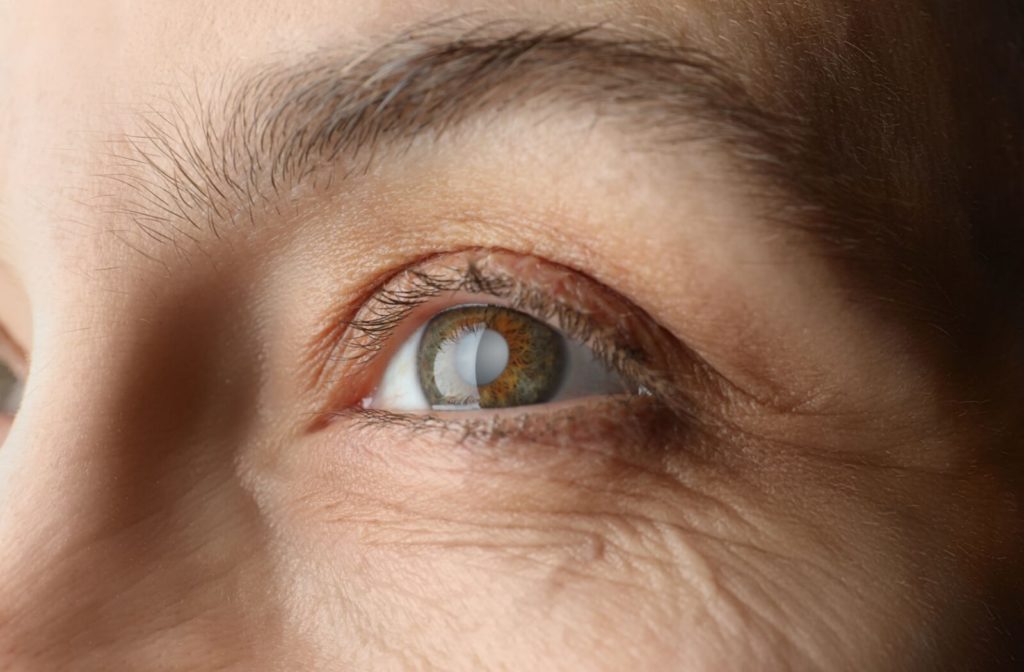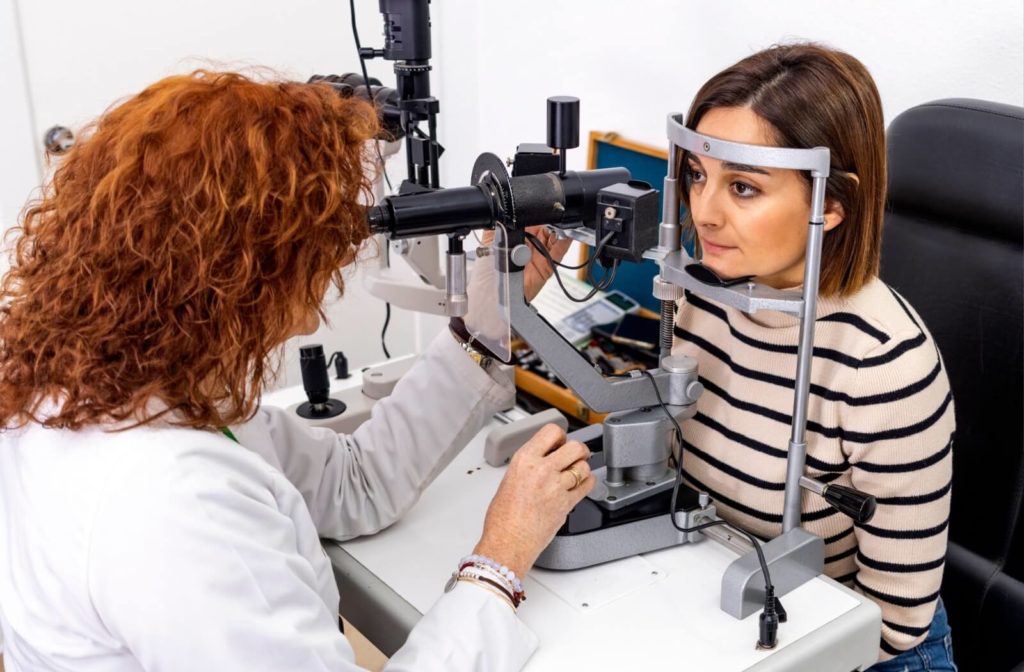While many people are aware that eye exams are important, they often don’t realize how many diseases these exams can detect.
Eye exams can detect a host of different conditions, ranging from common eye problems like cataracts and glaucoma, to less common but no less serious issues like macular degeneration, to a number of general health problems like diabetes and high blood pressure.
Let’s go over some of these diseases and discuss what they are.
Common Eye Diseases that Are Detected by Eye Exams
Presbyopia
Presbyopia is a consequence of aging, and makes it hard to focus on objects up close. This condition occurs when the lens of the eye becomes less flexible and elastic.
Symptoms of presbyopia include:
- Having to hold things at arm’s length to read them
- Eye fatigue and headaches when doing close work
- Trouble reading in dim light
- Blurry vision when reading at close distances
Presbyopia is typically treated with reading glasses, multifocal glasses and contact lenses. Less common treatments include surgery or medications.
Cataracts
Cataracts are cloudy spots on the crystalline lens of the eye that can cause blurriness or fogginess of vision. They occur when proteins in the lens of the eye begin to break down, often due to the process of aging.
Symptoms of cataracts include:
- Blurry vision
- Double vision
- Difficulty seeing at night
- Seeing dull or faded colours
- Increased light sensitivity
In early stages, the symptoms of cataracts can be mild, though glasses or contact lenses may be needed to preserve sharp vision. As the condition progresses, glasses and contacts might not be enough, in which case your optometrist might recommend that you have surgery.
Diabetic Retinopathy
The high blood sugar levels that result from diabetes can cause the weakening of blood vessels in the back of the eye, resulting in damage to the retina in the form of bleeding, swelling, and other changes. This is called diabetic retinopathy.
If left untreated, permanent vision loss may result. The treatment process involves controlling a person’s blood sugar levels, and may require interventions like eye injections or laser treatment.
Age-related Macular Degeneration (AMD)
AMD occurs when waste builds up in the macula (the centre part of the back of the eye, responsible for detailed vision) and causes our central vision to deteriorate. This deterioration can result in difficulty reading, recognizing faces, driving, or other detail-oriented work.
Early stages of AMD might not be accompanied by symptoms, and may only be detectable by an e exam. Given that AMD Is the leading cause of blindness in adults over 50 in North America, it’s crucial to schedule regular eye exams.
Vision loss caused by AMD cannot be fixed after the fact, so standard treatments involve limiting the progression of the disease, either (in the early stages) by supplements and monitoring or (in the later stages) by eye injections that help prevent loss of vision.
Glaucoma
Glaucoma is a group of diseases that cause damage to the optic nerve, and which can result in permanent vision loss. Much like AMD, glaucoma in its early stages often doesn’t result in symptoms. It can only be detected by measuring the pressure inside the eye, examining the optic nerve, and assessing the peripheral vision.
As glaucoma progresses, it causes the loss of peripheral vision, resulting in permanent tunnel vision that may interfere with many activities. Even with subsequent treatment, this lost vision can’t be restored.
Treatment of glaucoma often involves taking medication, but surgery is also an option if medication doesn’t prove effective.

Other Diseases Detectable by Eye Exams
Retinal Detachment
The retina is a layer of tissue located at the back of the eye that’s responsible for converting light into signals for the brain. In rare cases, the retina can be detached from the rest of the eye.
Once the retina detaches, light signals no longer reach the brain. This can result in vision loss or blindness.
Retinal detachment can be caused by a range of issues, and may involve some of the following symptoms:
- Seeing flashing lights or floating spots
- A general decrease in vision
- A decrease in vision that resembles a “curtain” or “veil” descending down
Retinal detachment is treated with surgery.
Diabetes
Diabetes is a condition in which the body can’t make or use insulin. While diabetes doesn’t come to mind as an eye disease, high levels of blood sugar can damage blood vessels in your retina, which eye exams can often detect before people even know that they have diabetes.
High Blood Pressure
While similar to diabetes in not being an eye condition, high blood pressure also has effects on the health of the eye. In particular, blood vessels in the back of the eye can indicate risk for heart attack and stroke before these conditions actually occur.
Cancer
Three kinds of cancer can be detected by eye exams:
- Brain tumors: Brain tumors can affect a person’s peripheral vision, and can damage nerves connected to the muscles in the eye.
- Skin cancer: The eye and the areas around it are common locations for skin cancer to occur.
- Other, rarer conditions: Eye exams can detect other unusual structures in the eye, including some rare forms of cancer as well as other kinds of irregular growths, some of which can be metastasis from elsewhere in the body.
Early detection
Not only can eye exams detect common eye conditions like cataracts or glaucoma, they are also able to detect rarer conditions such as retinal detachment or diseases like diabetes that we often don’t think of as related to the eye.
Early detection is important not just for your eye health, but also for your overall health in cases like high blood pressure or diabetes. To prevent more serious issues, make sure to schedule regular eye exams with your optometrist.If you have any concerns about your own eye health, or questions about an eye care topic, contact us and book an appointment today. At Red Deer Eye Care Centre, your wellbeing is our priority.



